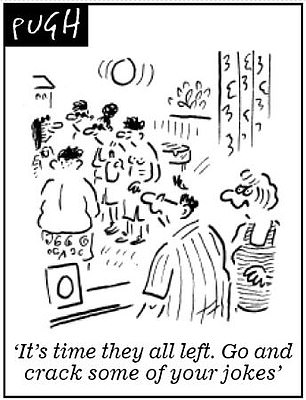They’re the groan-worthy one-liners and corny puns that usually make an appearance at any family gathering.
But if you hate your Dad’s jokes don’t worry – as it’s unlikely you’ll follow in his comedy footsteps, according to a study.
Experts have found that, unlike intelligence or eye colour, humour doesn’t run in the family.
In the first ever study to look at the influence of genes and the environment on comedic abilities, scientists compared over a thousand twins by asking them to create funny captions for cartoons.
The new findings, published in the journal Twin Research and Human Genetics, revealed there was no evidence that they inherited their humorous talents.
The study contained a mix of both identical twins, who share 100 per cent of their DNA, and non-identical twins, who are like any biological siblings and share about 50 per cent of their DNA.
If comedic ability was inherited, then the researchers would have expected to see stronger humour similarities between the identical twins compared to the non-identical twins.
However, they discovered that across all twin pairs, individuals shared the same level of comedic ability.

If you hate your Dad’s jokes don’t worry – as it’s unlikely you’ll follow in his comedy footsteps, according to the study (AI-generated image)
This indicates that humour is shaped by the environment – such as growing up in the same household – rather than genetics, the team said.
However, they said a small genetic effect could not be ruled out.
The results suggest that the reasons why you are funny or your jokes are met with silence may be more complex and difficult to assess than other cognitive abilities.
It could also help explain the rarity of comedy duos from the same family – such as the Chuckle Brothers or the Marx Brothers – compared to actors, musicians or writers.
Dr Gil Greengross, from the Psychology Department at Aberystwyth University, led the study.
He said: ‘Despite humour’s importance, relatively little is known about how we develop our sense of humour or why one sibling can be funny and another cannot.
‘Our study’s finding that these talents are not inherited is surprising, as it contradicts most research on the heritability of cognitive abilities such as creativity and mathematical skills.
‘So, it is really fascinating. But since this is the first study of its kind, these results should be interpreted with caution.’

The findings could also help explain the rarity of comedy duos from the same family – such as the Chuckle Brothers (pictured) compared to actors, musicians or writers

Dad jokes are important in helping children learn to be embarrassed by their parents, a researcher has previously argued (stock image)

He explained that while telling a joke may seem simple, having a good sense of humour is a complex and unique trait that is influenced by a range of psychological attributes and personality characteristics.
‘It varies across different social contexts, like when going on a date or entertaining,’ he said.
‘This may explain why, Chuckle and Marx Brothers aside, there are few successful comedians from the same immediate family.
‘What is exciting about this research is it begs the question: if our sense of humour is not handed down from our parents but comes from our environment, what is it precisely that makes us funny?’
The findings also have implications for how scientists think about humour’s role in evolution and even dating.
Dr Greengross added: ‘These early findings also challenge the widely accepted evolutionary basis of humour.
‘A great sense of humour can help ease tension in dangerous situations, foster cooperation, break down interpersonal barriers, and attract mates—all of which enhance survival and reproduction.
‘There are also intriguing dating and mating aspects to this.
‘Previous research has shown that women prioritise comedic talents in a partner more than do men, whereas men value a women’s ability to appreciate their humour.
‘Men experience stronger selection pressure to be funny to impress women, leading to men having slightly higher humour ability, on average — a finding supported by our study.
‘Furthermore, men rated themselves as funnier than women, likely reflecting an awareness of humour’s importance in female mate choice.’
Despite being cringeworthy, Dad jokes are important in helping children learn to be embarrassed by their parents, other experts have said.
MailOnline has previously revealed 40 of the funniest Dad jokes, as used in a 2019 study by researchers from UCL.
The hilarious quips include ‘What do you call a man with a spade on his head?’ – the answer of which, of course, is ‘Dug!’












